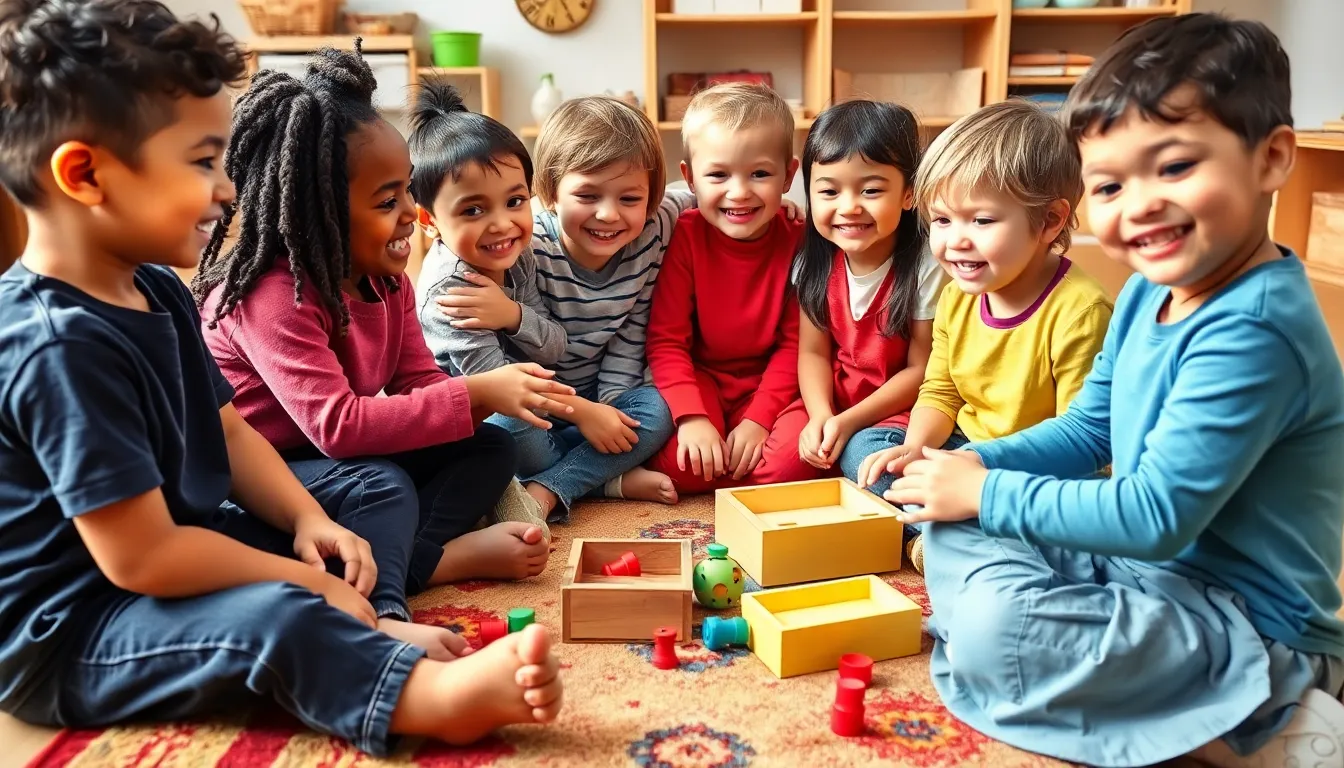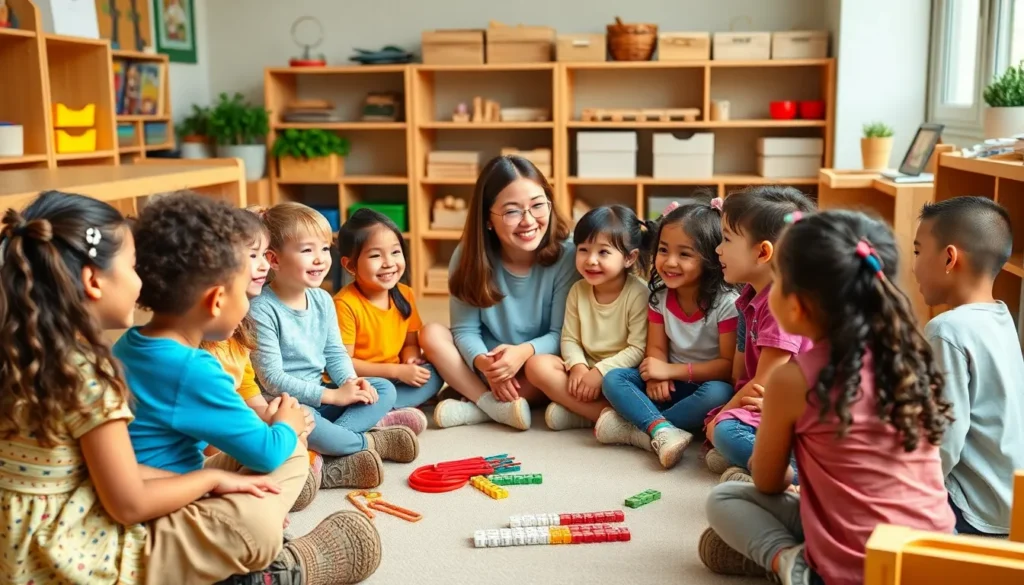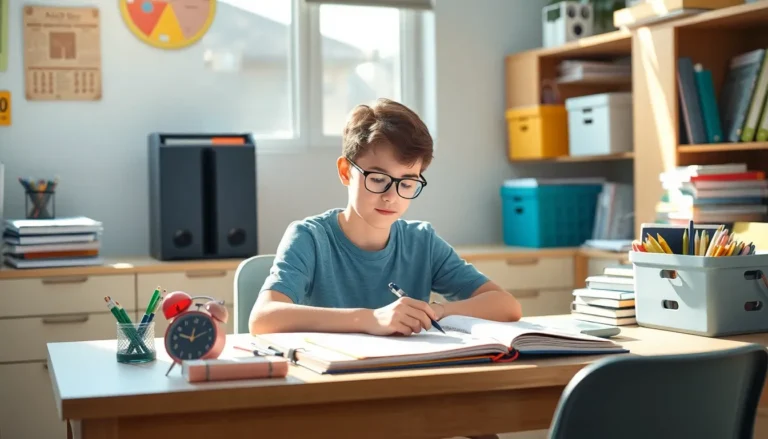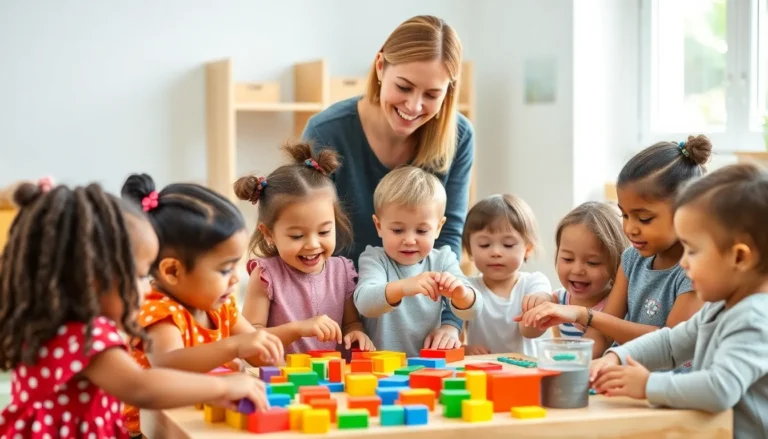Table of Contents
ToggleIn a world that sometimes feels like a chaotic game of dodgeball, Montessori peace education emerges as a refreshing approach to nurturing harmony and cooperation. This innovative educational philosophy doesn’t just teach kids to read and write; it equips them with the essential skills to navigate conflicts like seasoned diplomats. Imagine a classroom where children learn to resolve disputes over crayons with the same finesse as a UN ambassador negotiating peace treaties.
By fostering empathy and understanding, Montessori peace education transforms future generations into compassionate leaders. It’s not just about avoiding fights; it’s about building a community where kindness reigns supreme. So, if you think peace education sounds like a pie-in-the-sky concept, think again. It’s a practical, engaging way to raise children who can turn down the volume on discord and turn up the volume on cooperation.
Overview of Montessori Peace Education
Montessori peace education integrates conflict resolution into children’s learning environments. This approach encourages the development of essential skills such as empathy, active listening, and communication. Through activities designed for collaboration, children learn to navigate disagreements peacefully.
Teachers facilitate discussions that guide children in understanding their feelings and those of others. By promoting self-awareness, this education method shapes mindful individuals who recognize the impact of their actions. Establishing a respectful classroom culture forms the foundation of compassionate interactions.
Engagement in diverse activities enhances children’s ability to practice cooperation. These activities may include group projects, role-playing scenarios, and peer mediation exercises. Participating in these experiences cultivates a sense of community, allowing children to appreciate different perspectives.
Montessori peace education emphasizes the importance of proactive conflict resolution. Children discover ways to address conflicts constructively, minimizing discord among peers. By equipping them with these tools, educators foster a generation of responsible leaders who strive to create harmonized environments.
Incorporating peace education into daily routines provides ongoing opportunities for practice. Daily reflections often encourage children to express their thoughts and emotions in a supportive space. This continuous reinforcement allows them to internalize the principles of kindness and understanding.
Ultimately, Montessori peace education develops respectful and empathetic individuals. With a focus on both personal growth and community harmony, children learn lifelong skills essential for peaceful coexistence. As a result, they emerge as capable individuals ready to contribute positively to society.
Principles of Montessori Peace Education

Montessori peace education embodies core principles centered on nurturing a harmonious environment. It focuses on instilling respect for oneself and others while promoting essential conflict resolution skills.
Respect for Self and Others
Respect forms the foundation of Montessori education. Children learn to value their own feelings and recognize the emotions of peers. Self-awareness cultivates a sense of confidence and empathy. Activities like role-playing and group discussions provide opportunities for expressing thoughts respectfully. Understanding individual differences fosters a culture of appreciation. It also encourages children to show kindness and support towards one another. Actions are guided by respect, enabling children to establish positive relationships in their communities.
Conflict Resolution Skills
Developing conflict resolution skills is crucial in Montessori peace education. Children engage in discussions that highlight effective communication techniques. These conversations teach them to express their feelings clearly while listening to others. Strategies such as peer mediation allow children to practice resolving conflicts constructively. Emphasis on collaboration nurtures problem-solving abilities and enhances teamwork. They also learn to approach disagreements with understanding. Constructive methods enable children to find solutions that benefit everyone involved. Engaging in these practices instills lifelong conflict resolution competencies.
Implementation in the Classroom
Montessori peace education thrives within the classroom. It integrates essential elements that foster a peaceful and empathetic learning environment.
Curriculum Design
Curriculum design incorporates conflict resolution and empathy-building activities. Lessons include elements like role-playing, storytelling, and group discussions. These methods encourage students to express their feelings while understanding others. Engaging in hands-on projects helps learners practice cooperation and appreciate diverse perspectives. Additionally, activities promote self-awareness and emotional intelligence, aiding personal growth. Structured environments allow children to take ownership of their learning, reinforcing mutual respect and kindness. Emphasizing real-life situations, the curriculum nurtures lifelong skills in resolving conflicts effectively.
Teacher’s Role
Teachers facilitate peace education by guiding discussions and modeling respectful behavior. Through observation, they provide support tailored to each child’s needs. Encouraging open dialogue helps students articulate feelings and concerns. Teachers foster an inclusive atmosphere, making every voice heard. They introduce conflict resolution strategies, such as peer mediation, empowering children to solve issues collaboratively. Building relationships with students promotes trust and openness. As mentors, teachers instill values of empathy and respect, demonstrating their importance in daily interactions. This supportive presence shapes a positive classroom culture centered around peace and understanding.
Benefits of Montessori Peace Education
Montessori peace education provides numerous advantages, shaping children into compassionate individuals. Through its focus on essential skills, it transforms the learning environment.
Social and Emotional Development
Social and emotional development flourishes within a Montessori peace education framework. Children cultivate empathy as they navigate their relationships with others. Different activities, such as collaborative projects and peer discussions, foster active listening skills. These interactions enhance children’s self-awareness and confidence. By recognizing their own emotions and those of others, they learn respectful communication techniques. Moreover, engaging in role-playing scenarios allows children to express feelings healthily. Emotional intelligence develops as they practice resolving conflicts together. Ultimately, skills acquired during these formative years contribute to their overall personal growth.
Fostering Global Citizenship
Fostering global citizenship stands as a core component of Montessori peace education. Children learn to appreciate diverse perspectives through activities that celebrate multiculturalism. Exposure to different cultures encourages respect and kindness toward others. Developing an understanding of global issues nurtures their sense of responsibility. In group discussions, they engage in problem-solving exercises that emphasize cooperation. As students collaborate to address shared challenges, they build strong connections. Enhanced awareness of their role in the world empowers them to act positively within their communities. Consequently, Montessori peace education prepares them to become leaders who foster peace and understanding on a global scale.
Challenges and Considerations
Implementing Montessori peace education presents several challenges that educators must navigate. Training teachers adequately stands out as a primary consideration. In-depth knowledge of conflict resolution techniques is essential for teachers to model appropriate behaviors. Without consistent training, the effectiveness of peace education diminishes.
Adapting traditional curricula can also pose difficulties. Integrating peace education into existing frameworks requires careful planning and collaboration among staff. Coordinating schedules to ensure ample time for peace-building activities remains another challenge. Limited resources may restrict access to materials that support these initiatives.
Classroom dynamics represent another significant consideration. Not every child possesses the same emotional maturity or social skills. Educators must tailor activities to accommodate varying developmental stages. Such differentiation ensures all students engage meaningfully with the curriculum.
Community involvement plays a crucial role in its success. Parents and caregivers must understand the principles of Montessori peace education. Without their support, fostering a consistent approach at home becomes challenging. Educators should engage families through workshops and discussions to promote a shared understanding.
Measuring the impact of peace education represents an additional challenge. Standardized testing often overlooks social and emotional development. Alternative assessment methods require implementation to evaluate progress effectively. Teachers can use observations and portfolios to track students’ growth in empathy and conflict resolution.
Ultimately, addressing these challenges requires commitment and collaboration within the educational community. Montessori peace education thrives when all stakeholders actively participate in fostering a compassionate, understanding environment.
Montessori peace education stands as a transformative approach that equips children with vital life skills. By emphasizing empathy and conflict resolution, it nurtures compassionate leaders who are prepared to tackle the complexities of today’s world. The integration of peace education into the curriculum not only enhances emotional intelligence but also fosters a sense of global citizenship.
As educators and communities commit to these principles, they create environments where respect and understanding thrive. This collaborative effort ensures that children learn to appreciate diverse perspectives, paving the way for a more harmonious future. The lasting impact of Montessori peace education extends beyond the classroom, shaping individuals who contribute positively to society.





